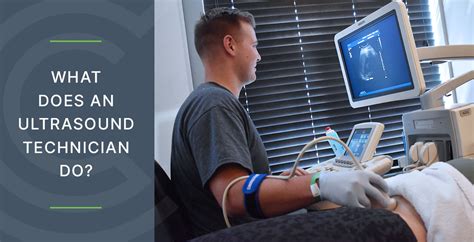A Day in the Life of an Ultrasound Tech: Exploring the World of Diagnostic Imaging
Ultrasound technology has revolutionized the field of medicine, enabling healthcare professionals to visualize internal organs and tissues in real-time. At the forefront of this technology are ultrasound technicians, also known as diagnostic medical sonographers. These skilled professionals play a crucial role in helping doctors diagnose and treat a wide range of medical conditions. In this article, we will delve into the daily life of an ultrasound tech, exploring their responsibilities, challenges, and rewards.
The Morning Routine
An ultrasound tech's day typically begins early, around 7:00 or 8:00 am. They start by reviewing their schedule for the day, checking the list of patients they will be scanning, and familiarizing themselves with the specific exams they will be performing. This involves reviewing patient charts, understanding the doctor's orders, and preparing the necessary equipment.

Preparing for Scans
Before starting the scans, the ultrasound tech prepares the examination room, ensuring that all necessary equipment is available and in working order. This includes the ultrasound machine, gel, and any additional equipment required for specific exams, such as doppler or elastography.
Scanning Patients
The ultrasound tech's primary responsibility is to perform diagnostic scans on patients. This involves applying gel to the patient's skin, positioning the transducer (the device that produces the high-frequency sound waves), and adjusting the machine settings to capture high-quality images. The tech must also ensure that the patient is comfortable and informed throughout the process.

Capturing Images and Data
During the scan, the ultrasound tech captures images and data, which are then stored in the patient's electronic medical record. The tech must ensure that all relevant images are captured, including measurements and annotations. This requires a high level of concentration and attention to detail.
Analyzing Images and Data
After completing the scan, the ultrasound tech analyzes the images and data, looking for any abnormalities or signs of disease. They may also perform measurements and calculations to help diagnose conditions such as fetal growth restriction or liver disease.
Collaborating with Healthcare Professionals
Ultrasound techs work closely with other healthcare professionals, including radiologists, obstetricians, and cardiologists. They provide critical information that helps doctors diagnose and treat patients. The tech may also be required to participate in multidisciplinary team meetings to discuss patient care.
Challenges and Rewards
Working as an ultrasound tech can be challenging, both physically and emotionally. The job requires standing for long periods, lifting equipment, and dealing with anxious or uncomfortable patients. However, the rewards are numerous. Ultrasound techs have the opportunity to make a real difference in patients' lives, helping doctors diagnose and treat life-threatening conditions.

Skills and Qualifications
To become an ultrasound tech, one must possess a strong foundation in anatomy, physiology, and physics. They must also have excellent communication and interpersonal skills, as well as the ability to work independently and as part of a team. Most ultrasound techs hold an associate's degree or higher in diagnostic medical sonography.
Specializations
Ultrasound techs can specialize in various areas, including:
- Obstetric and gynecologic sonography
- Cardiac sonography
- Vascular sonography
- Pediatric sonography
- Musculoskeletal sonography
Each specialization requires additional education and training, as well as certification.
Certification and Professional Development
The American Registry for Diagnostic Medical Sonography (ARDMS) offers certification for ultrasound techs. To become certified, one must pass a written exam and a practical skills assessment. The ARDMS also offers continuing education opportunities to help ultrasound techs stay up-to-date with the latest technologies and techniques.
Gallery of Ultrasound Tech Images






Frequently Asked Questions
What is the average salary for an ultrasound tech?
+The average salary for an ultrasound tech varies depending on location, experience, and specialization. However, according to the Bureau of Labor Statistics, the median annual salary for diagnostic medical sonographers was $75,380 in May 2020.
How long does it take to become an ultrasound tech?
+Typical programs for diagnostic medical sonography last two years and lead to an associate's degree. Some colleges and universities also offer four-year bachelor's degree programs.
Is certification required to work as an ultrasound tech?
+While certification is not always required, it is highly recommended. The American Registry for Diagnostic Medical Sonography (ARDMS) offers certification for ultrasound techs, which demonstrates expertise and commitment to the profession.
In conclusion, working as an ultrasound tech can be a rewarding and challenging career. With the right skills, education, and training, ultrasound techs play a critical role in helping doctors diagnose and treat patients. Whether you are just starting your career or looking to specialize in a particular area, the field of diagnostic medical sonography offers many opportunities for growth and development.
